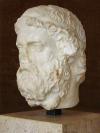Biography
Anacreon ((570 BC - 488 BC) was a Greek lyric poet, notable for his drinking songs and hymns. Later Greeks included him in the canonical list of nine lyric poets.
Anacreon wrote all of his poetry in the ancient Ionic dialect. Like all early lyric poetry, it was composed to be sung or recited to the accompaniment of music, usually the lyre. Anacreon's verses were primarily in the form of monody, which means that they were to be performed by a single voice rather than by a chorus.
In keeping with Greek poetic tradition, his poetry relied on meter for its construction. Metrical poetry is a particularly rhythmic form, deriving its structure from patterns of phonetic features within and between the lines of verse. The phonetic patterning in Anacreon's poetry, like all the Greek poetry of the day, is found in the structured alternation of "long" and "short" vowel sounds. The Ionic dialect also had a tonal aspect to it that lends a natural melodic quality to the recitation. Anacreon's meters include the anacreonteus.
The Greek language is particularly well suited to this metrical style of poetry but the sound of the verses does not easily transfer to English. As a consequence, translators have historically tended to substitute rhyme, stress rhythms, stanzaic patterning and other devices for the style of the originals, with the primary, sometimes only, connection to the Greek verses being the subject matter. More recent translators have tended to attempt a more spare translation which, though losing the sound of the originals, may be more true to their flavor. A sample of a translation in the English rhyming tradition is included below.
Themes and subjects of Anacreon's poetry
Anacreon's poetry touched on universal themes of love, infatuation, disappointment, revelry, parties, festivals, and the observations of everyday people and life. It is the subject matter of Anacreon's poetry that helped to keep it familiar and enjoyable to generations of readers and listeners. His widespread popularity inspired countless imitators, which also kept his name alive.
Anacreon had a reputation as a composer of hymns, as well as of those bacchanalian and amatory lyrics which are commonly associated with his name. Two short hymns to Artemis and Dionysus, consisting of eight and eleven lines respectively, stand first amongst his few undisputed remains, as printed by recent editors. But hymns, especially when addressed to such deities as Aphrodite, Eros and Dionysus, are not so very unlike what we call "Anacreontic" poetry as to make the contrast of style as great as the word might seem to imply. The tone of Anacreon's lyric effusions has probably led to an unjust estimate, by both ancients and moderns, of the poet's personal character. The "triple worship" of the Muses, Wine and Love, ascribed to him as his religion in an old Greek epigram (Anthol. iii.25, 51), may have been as purely professional in the two last cases as in the first, and his private character on such points was probably neither much better nor worse than that of his contemporaries. Athenaeus remarks acutely that he seems at least to have been sober when he wrote; and he himself strongly repudiates, as Horace does, the brutal characteristics of intoxication as fit only for barbarians and Scythians (Fr. 64).
Of the five books of lyrical pieces by Anacreon which the Suda and Athenaeus mention as extant in their time, we have now but the merest fragments, collected from the citations of later writers.
A collection of poems by numerous, anonymous imitators was long believed to be the works of Anacreon himself. Known as the Anacreontea, it was preserved in a 10th century manuscript which also included the Palatine Anthology. The poems were published in 1554 with a Latin translation by Henry Estienne, known as Stephanus, but little is known about the origins of the manuscript. Salmasius reports seeing the Anacreontea at the library in Heidelberg in 1607. In 1623, it was given to Pope Gregory XV after the sacking of Heidelberg. It was later taken from the Vatican City by Napoleon in 1797, who had it rebound as two separate volumes. One of those volumes was returned to Heidleberg but the other remained in the Bibliothèque Nationale in Paris.
In the 17th century, Thomas Stanley translated the Anacreontea into English verse. A few poems were also translated by Robert Herrick and Abraham Cowley. The poems themselves appear to have been composed over a long period of time, from the time of Alexander the Great until the time that paganism gave way in the Roman Empire. They reflect the light hearted elegance of much of Anacreon's genuine works although they were not written in the same Ionic Greek dialect that Anacreon used. They also display literary references and styles more common to the time of their actual composition. ..






